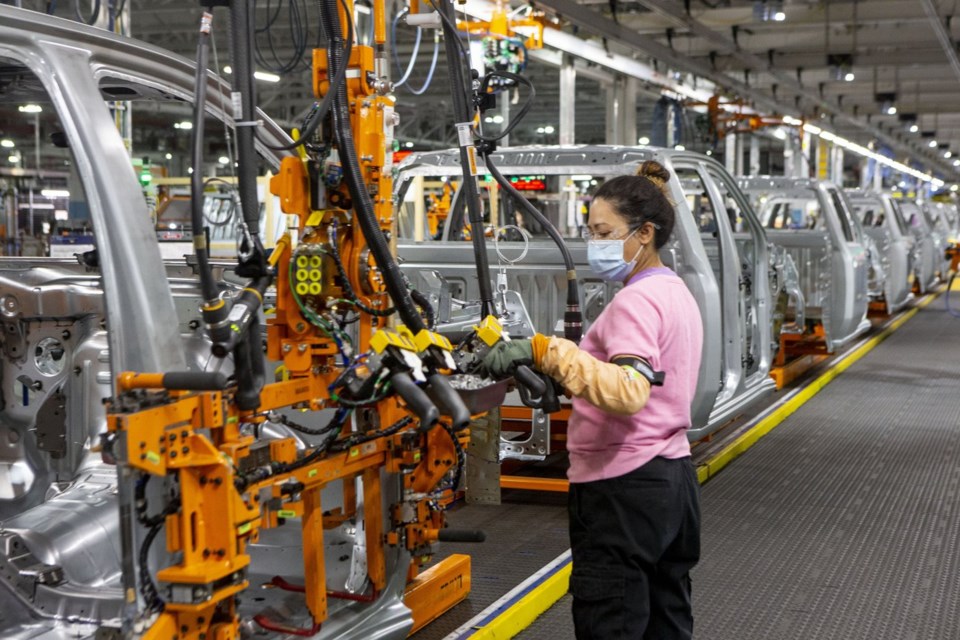TORONTO — Automakers in Canada, along with workers and everyone else with ties to the industry, are struggling to grasp the implications of and how best to respond to the ruinous industry tariffs that came into effect Thursday.
"Stellantis continues to assess the effects of the recently announced U.S. tariffs on imported vehicles," said spokeswoman LouAnn Gosselin in a statement.
While the company is still working to figure things out, they've wasted no time in starting to pause production because of the added costs. Stellantis said Wednesday it would institute a two-week shutdown at its Windsor Assembly Plant.
The union said the company has indicated more shift cuts could be coming.
"Our members are concerned for their jobs and frustrated by the uncertainty that these unjust and needless tariffs are creating across the industry,” said Unifor Local 444 President James Stewart in a statement.
The shutdown affects some 3,600 workers, said Prime Minister Mark Carney, as he lamented that a 60-year history of co-operatively building up an integrated automotive sector with the U.S. is no more.
"That era, that era has now ended."
Honda and Toyota said Thursday that they were pushing ahead with production despite the 25 per cent tariffs that are now in effect, while noting that they, too, are still trying to digest what this all means.
"We are working with our manufacturing, parts, trade and logistics providers across North America to understand the impact of the announced U.S. tariffs," said Honda spokesman Ken Chiu.
Toyota is working with the federal and Ontario government to find solutions but is pushing on with building vehicles, said spokesman Philippe Crowe in a statement.
"While this is still a highly fluid situation, we have no plans to change our production within the foreseeable future."
Ford and General Motors didn't respond to a request for comment.
Automakers still have some reprieve, as tariffs are on hold for some vehicle parts compliant with the Canada-U.S.-Mexico free trade agreement. But that's only until the U.S. determines how it will exempt just the value of U.S. parts in the vehicle.
Producers will also be able to apply to have the U.S. content of Canada-US-Mexico free trade compliant vehicles deducted from the tariff costs, subject to approval by the U.S. Department of Commerce.
But even the potential discount will still only be helpful for the short-term, said Flavio Volpe, president of the Automotive Parts Manufacturers' Association.
"No one will be able to do this mathematically (for) more than a few days, but it's important."
He's long predicted that plants would start to shut down and workers get laid off if auto tariffs went ahead, and said the Stellantis Windsor closure, along with more from the company in Mexico and the U.S., is the "dead canary" in the coal mine.
"It's not normal for Stellantis to close a plant for two weeks that's just been retooled, and has two segment leaders that have just been launched, in its most productive plant in its fleet. It's not normal."
The closure, along with the big dives on the market Thursday in response to the wider tariff escalation, will hopefully put pressure on Trump to let up on the tactic, said Volpe.
Everyone is trying to figure out what is exactly is happening, and where all this goes, said Sam Fiorani, vice president of global vehicle forecasting at AutoForecast Solutions.
"Having this much disturbance in the status quo is very difficult to to navigate," said Fiorani.
Stellantis closing the Windsor plant made some sense because after retooling, it's currently only producing the electric version of its Dodge Charger muscle cars, which aren't selling as well as they had planned, while gas-powered ones aren't set to restart production for a few months, he said.
The company does also produce Chrysler minivans that are top in the segment, but it's a segment fading in popularity, he said.
Honda and Toyota, meanwhile, both produce hundreds of thousands of their best-selling crossover CR-V and RAV4s in Ontario, making it harder for those companies to cut back.
But other companies across the industry won't be able to hold out much longer.
"Somebody had to be first," said Fiorani.
"It's just a matter of time when the next one happens because there are going to be more to follow."
This report by The Canadian Press was first published April 3, 2025.
Ian Bickis, The Canadian Press




